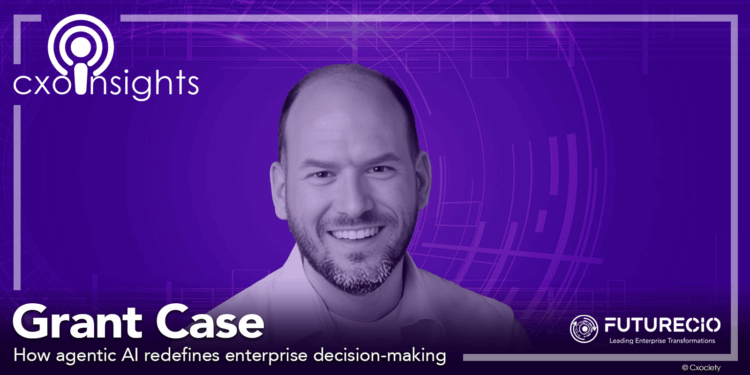Across Asia Pacific and Japan (APJ) boardrooms, the initial excitement around generative AI has given way to a pressing demand: "Show me the real impact."
Experiments are done. Budgets are spent. Now, the C-suite wants tangible results from their AI investments.
The answer emerging isn't just smarter automation; it's a leap towards autonomy.
Welcome to the era of Agentic AI.
To be clear, these aren't your standard run-of-the-mill tools; they are intelligent, independent agents capable of perceiving complex situations, reasoning through options, and taking decisive action – often without human intervention (but with the option for humans to intervene just in case).
Agentic AI frees your staff from repetitive tasks, can adapt dynamically, and orchestrate decisions at unprecedented speed and scale.
For the fast-moving, diverse, and efficiency-critical markets of APJ, Agentic AI has shifted from a 'nice-to-have' novelty to a competitive imperative.
This is the move from Automation to Autonomy, fundamentally redefining how enterprises make decisions."
According to IDC research, nearly 90% of organisations in Southeast Asia are expected to use agentic AI by 2026, with 42% already deploying the technology and a further 44% planning to adopt it within the next 12 months.
2025 is thus defined as the year when small trials give way to broad strategic integration, driven by relentless pressures for productivity, innovation, and competitive differentiation.
Agentic AI brings the promise of truly intelligent automation, going beyond prompt-based legacy AI. These systems can perceive situational complexity, reason through options, and execute decisions with minimal or no human oversight.
Grant Case, chief data officer at Dataiku, underscores that "they are intelligent, independent agents capable of perceiving complex situations, reasoning through options, and taking decisive action, often without human intervention."
Key trends reshaping enterprise decision-making
The Complete Guide to Autonomous Intelligence Resolution list four trends:
- Enterprise-wide integration: Agentic AI is moving beyond pilot projects to full deployment across whole business functions such as customer support, risk management, productivity, and supply chain.
- Multi-agent collaboration: Enterprises are using specialised autonomous agent networks that work together, improving problem-solving speed by up to 45% and accuracy by 60%.
- Vertical specialisation: Tailored agentic AI solutions for sectors like finance, manufacturing, and retail deliver significantly higher returns due to deep industry expertise incorporated in the agents.
- Real-time decision-making: Agentic AI enables rapid, event-driven decisions in areas such as trading and emergency response, reducing response times by 90% and substantially boosting accuracy.
Adoption trends in APJ
PwC's 2025 AI predictions suggest that AI agents could double the knowledge workforce capacity, automating routine decisions in sales and support, thereby accelerating time-to-market and enhancing customer interactions.
In Asia, where diverse economies from Singapore's fintech hubs to India's manufacturing giants grapple with labour shortages and supply chain volatility, agentic AI offers a competitive edge.
For instance, SK Telecom in South Korea is deploying proactive agents to handle contextual tasks, from scheduling to personalised recommendations, illustrating how telecom firms are redefining operational agility.
Unlocking opportunities
Opportunities abound for CIOs and CDOs to harness agentic AI in transforming decision-making. Operationally, it streamlines mundane processes, freeing leaders to focus on strategic pursuits.
"How do we work with employees to ensure that they are onboarded correctly?... Agents can react in a way beyond just what a set of standard rules can do," Case highlights in internal use cases.
This aligns with Capgemini's findings, which show that AI agents can boost productivity by 10-12% in healthcare organisations through process summaries and exception handling. Strategically, agentic AI empowers innovation by meshing disparate data sources.
"What if I could start meshing at different data sources and going out? Agents are going to be able to do that," notes Case.
In retail, a Dataiku customer uses agents to condense inventory insights for store clerks, saving 10-15 minutes per shift across thousands of outlets—mundane yet multiplicative value.
Navigating challenges and risks
Yet, challenges and risks loom large, demanding vigilant governance. Gartner warns that over 40% of agentic AI projects may falter by 2027, citing soaring costs, vague ROI, and weak risk controls—issues amplified in Asia's heterogeneous regulatory environments.
Trust erosion is evident: Capgemini's survey reveals only 27% of organisations trust fully autonomous agents, down from 43% in 2024, amid concerns over bias, privacy, and 'black box' opacity.
"The flip side... is the security, which is always, for our CISO friends, something very concerning. I start worrying about things like exfiltration of data, prompt injection," Case echoes.
Infrastructure gaps compound risks; Gmelius reports 86% of firms need upgrades for core processes by 2025. In Asia, geopolitical tensions and data sovereignty—highlighted in Deloitte's sovereign AI trends—heighten risks, with potential for regulatory fragmentation stalling adoption.
Employee anxiety over job displacement, noted by 61% in Capgemini's study, underscores the need for reskilling, as PwC advises establishing 'centres for agents' to blend human oversight with AI efficiency.
Dataiku's enabling role
Dataiku's platform addresses these hurdles, enabling seamless agent development and orchestration.
"Dataiku as a platform... has been one with the encompassing thought of how do I take the technologies from the start to the finish?... Building that capability and then... observability becomes paramount," Case explains.
This low-code approach raises the floor for non-developers, ensuring governance and monitoring to mitigate stochastic LLM behaviours.
Next steps
Drawing from Case's insights, the true power of agentic AI lies in making AI 'boring'—seamlessly integrating into enterprises to drive actions that save money, generate revenue, and enhance experiences.
"This is why I believe... this is going to be so much more incredible than generative AI," he asserts.
For APJ leaders navigating 2025-2026, embracing agentic AI demands starting small, fostering vendor partnerships, and prioritising human-in-the-loop frameworks. Those who act now will not merely automate decisions but redefine them, turning autonomy into a strategic imperative.
As Case urges CXOs:

"Start to reach out to your vendors... and ultimately, treat it like every other technology... But the benefits could be substantially more because, again, we're taking action."
The era of agentic decision-making beckons—seize it to stay ahead in Asia's dynamic markets.
Click on the PodChats player to hear Case discuss in detail his perspective on the journey from automation to autonomy – how agentic AI will redefine decision-making in APJ.
- What exactly is Agentic AI, and why should APJ enterprises be prioritising it right now, beyond the initial generative AI hype?"
- What specific market pressures and business opportunities in APJ are making the adoption of Agentic AI so critical at this moment?"
- How does Agentic AI unlock innovation and ensure alignment with measurable ROI for executives?"
- Can you share concrete examples of APJ enterprises leveraging Agentic AI today? What specific competitive advantages are they realising?"
- How does Dataiku's Universal AI Platform specifically enable the development and orchestration of these autonomous agents?"
- Autonomy raises concerns. How does Dataiku ensure essential governance, maintain human control, and enable seamless integration of Agentic AI within complex existing enterprise environments?
- For a CIO looking to embrace this, what does a practical roadmap look like – from establishing the vision to achieving enterprise-wide scale with Agentic AI?"
- How can organisations begin small with Agentic AI, prove concrete ROI quickly, and then expand capabilities safely and effectively?
- You talked about the 'Do It For Me' economy. How will Agentic AI evolve over the next 2-3 years to fulfil this expectation within APJ enterprises?"
- What is your advice for C-Suites in 2026?




